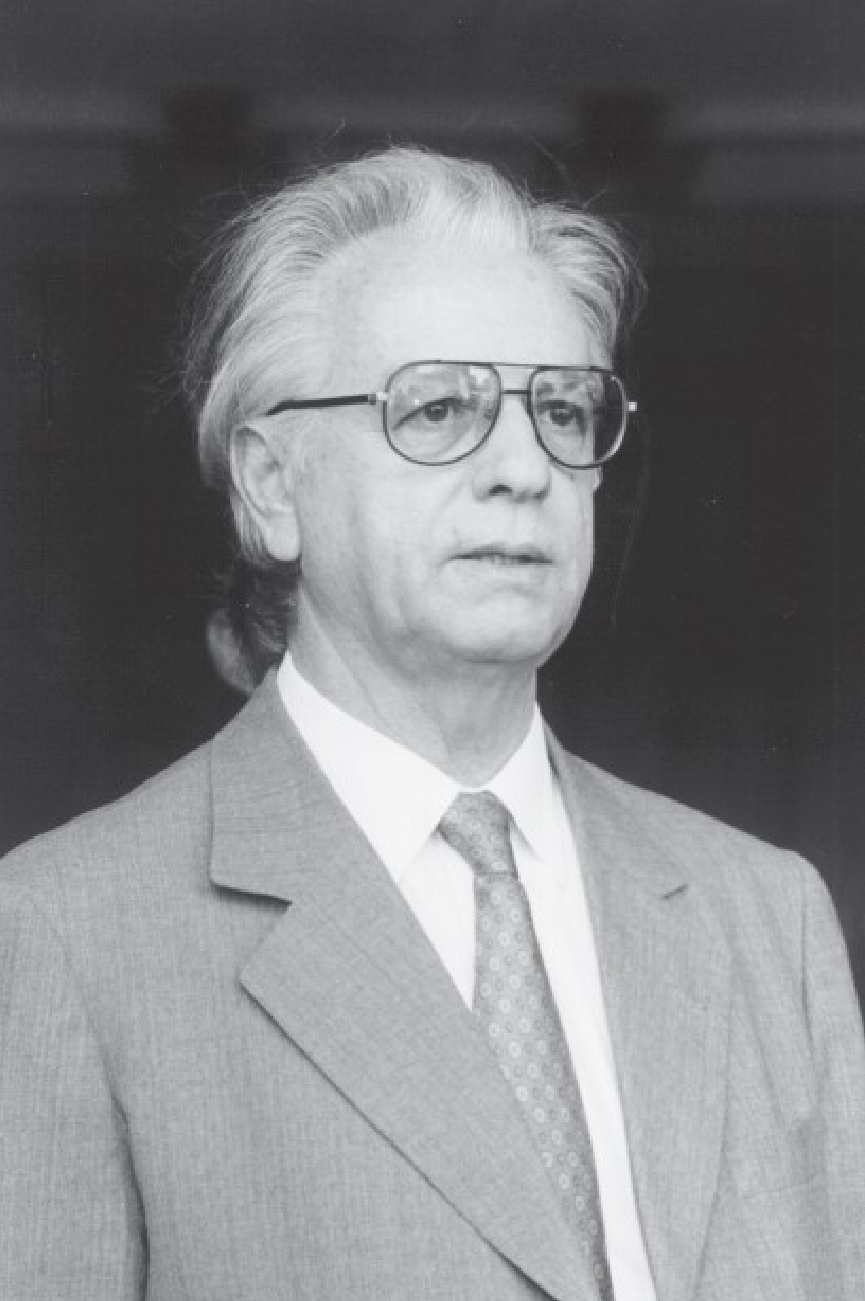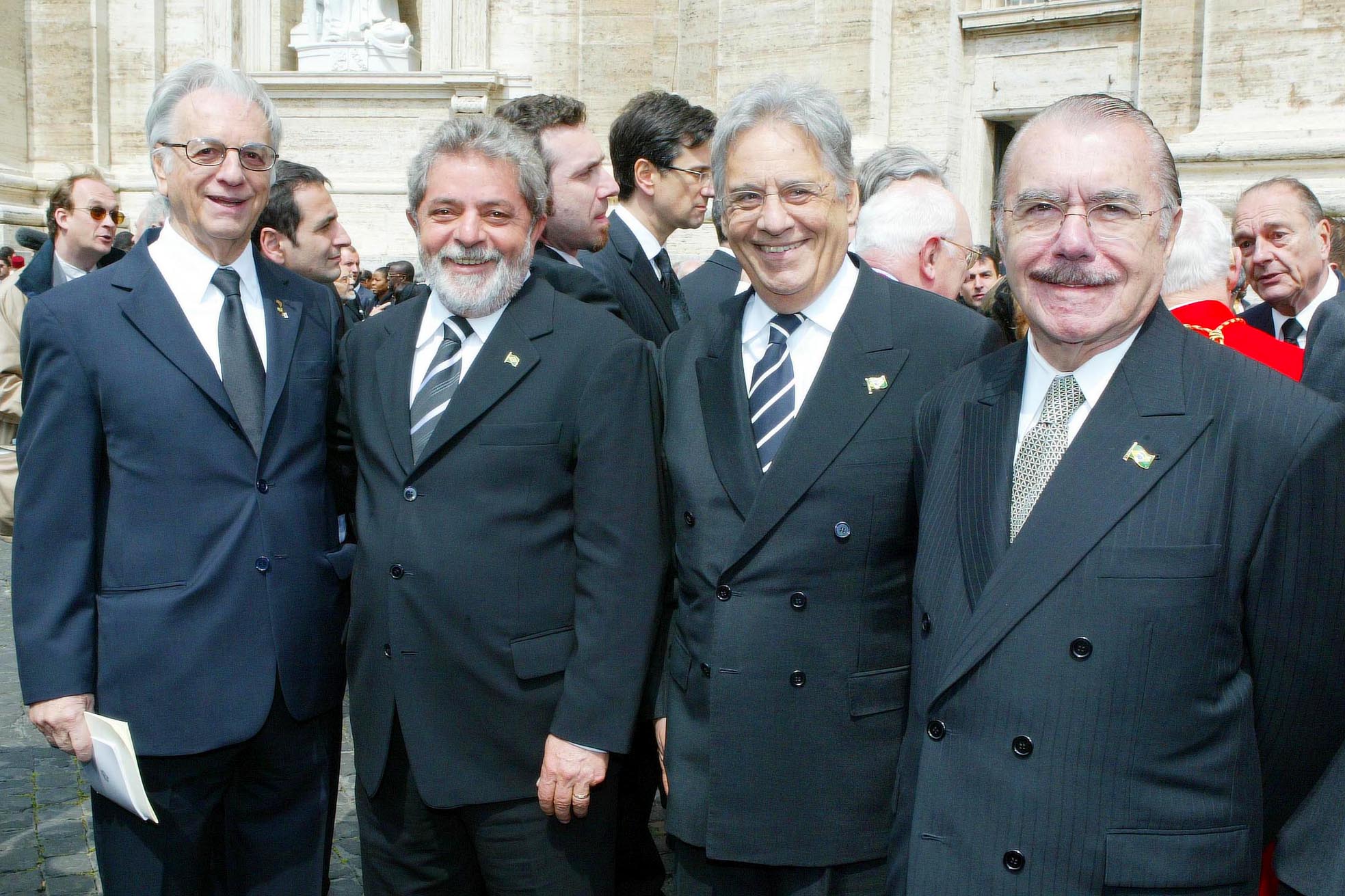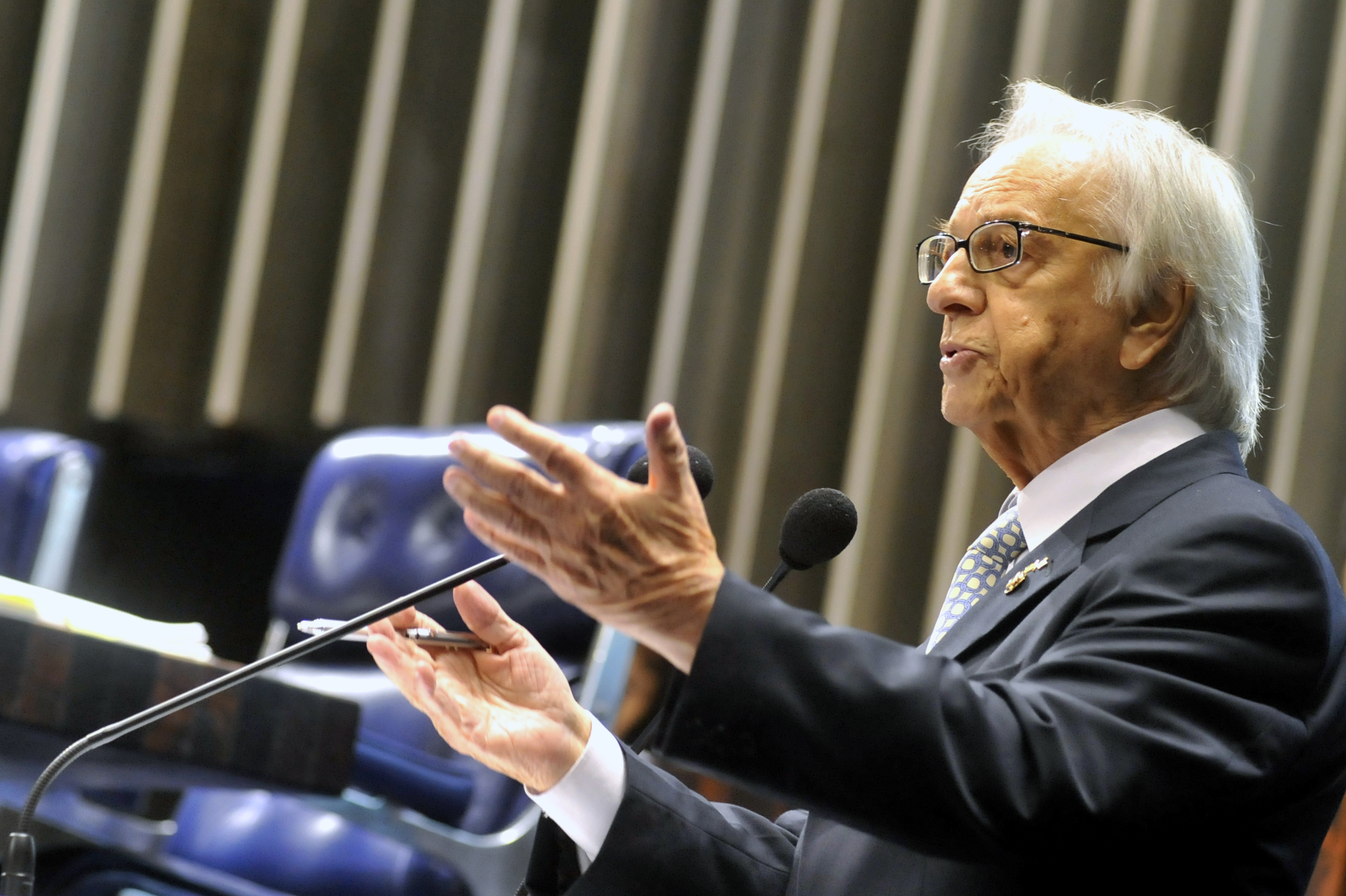1. Early Life and Background
Itamar Franco's early life was marked by an unusual birth and a strong family background in engineering.
1.1. Birth and Family Background
Franco was born prematurely at sea on June 28, 1930, aboard a ship traveling between Salvador and Rio de Janeiro. His birth was officially registered in Salvador. The unique circumstance of his birth is sometimes said to have influenced his first name, "Itamar," which is a portmanteau of the ship's name "Ita" and the Portuguese word for sea, "mar." On his father's side, he was of partial German descent, stemming from the Stiebler family in Minas Gerais. His maternal lineage was entirely Italian, as both of his maternal grandparents had emigrated to Brazil from Italy. His mother's name was Itália, which fittingly means "Italy" in Portuguese. Franco's father passed away before his birth.
1.2. Education and Early Career
Franco grew up in Juiz de Fora, Minas Gerais, the city where his family was from. He pursued higher education in engineering, graduating as a civil engineer in 1955 from the School of Engineering of Juiz de Fora, an institution now part of the Federal University of Juiz de Fora (UFJF). This academic background would precede his entry into the political arena.
2. Political Career
Itamar Franco's political career spanned several decades, encompassing local, national, and international roles, marked by his commitment to democratic principles and economic stability.
2.1. Entry into Politics and Senatorial Activities
Franco began his political journey in the mid-1950s in his hometown of Juiz de Fora. He first served as an alderman and deputy mayor before being elected mayor for two terms, from 1967 to 1971 and again from 1973 to 1974. In 1974, he resigned from his mayoral post to successfully run for the Federal Senate, representing Minas Gerais. He quickly rose to prominence within the Brazilian Democratic Movement (Movimento Democrático BrasileiroMDBPortuguese), which served as the official opposition to the military regime governing Brazil from 1964 to 1985. He held the position of deputy leader in the MDB during 1976 and 1977.
Re-elected as a senator in 1982, Franco made an unsuccessful bid for the governorship of Minas Gerais in 1986 as a candidate for the Liberal Party (PL). During his time in the Senate, he was a pivotal figure in the movement advocating for the immediate restoration of direct presidential elections, an initiative that initially failed but gained significant public traction. He also served as the PL leader in the Senate.
As a member of the National Constituent Assembly, which convened on February 1, 1987, Franco actively participated in shaping Brazil's new constitution. He voted in favor of crucial provisions such as the severance of diplomatic relations between Brazil and countries practicing racial discrimination (like then-South Africa), the establishment of the collective writ of mandamus, and a mandate for 50% overtime pay after a forty-hour work-week. He also supported the legalization of abortion, continuous six-hour shifts with notice proportional to length of service, union unity, popular sovereignty, the nationalization of subsoil resources, and the nationalization of the financial system to limit the external debt burden, alongside the creation of a fund to support land reform. Conversely, he opposed the reintroduction of the death penalty, the confirmation of the presidential system (preferring a parliamentary government), and the extension of President José Sarney's term, whom he publicly opposed and called for his removal due to alleged corruption. Despite their past antagonism, Sarney would later become one of Franco's allies when Franco assumed the presidency.
2.2. Vice Presidency (1990-1992)

In 1989, Franco left the Liberal Party and joined the nascent National Reconstruction Party (Partido da Reconstrução NacionalPRNPortuguese), where he was chosen as the running mate for presidential candidate Fernando Collor de Mello. Franco's selection was strategic; he represented Minas Gerais, one of Brazil's largest states, contrasting with Collor, who hailed from the smaller state of Alagoas. Additionally, his public condemnation of President José Sarney over corruption allegations had garnered him significant public recognition.
Collor and Franco secured a narrow victory in the election against Luiz Inácio Lula da Silva, who would later become president from 2003 to 2010. Once in office as Vice President, Franco frequently clashed with President Collor, openly expressing his disagreements with several of the administration's policies, particularly regarding privatization. These policy disputes led him to threaten resignation on multiple occasions.
On September 29, 1992, Collor was formally charged with corruption, leading to his impeachment by the Congress. Under the Brazilian Constitution, an impeached president's powers are suspended for 180 days. Consequently, Franco assumed the role of acting president on October 2, 1992. Collor officially resigned on December 29, 1992, as it became clear that the Senate would convict and remove him, at which point Franco formally took the oath of office as President. Despite having served as Vice President for nearly three years, polls indicated that a significant majority of the Brazilian population was unfamiliar with him when he initially became acting president.
2.3. Presidency (1992-1995)
During his presidency, Itamar Franco faced the immense challenge of stabilizing a nation in severe economic crisis, while also working to restore public trust in government.
2.3.1. Domestic Policy and Leadership

Franco ascended to the presidency amidst a profound economic crisis in Brazil, characterized by rampant hyperinflation. Inflation rates had soared to 1,110% in 1992 and further escalated to nearly 2,400% in 1993. Although he developed a reputation as a somewhat mercurial leader, one of his most impactful decisions was to appoint Fernando Henrique Cardoso as his Finance Minister. Cardoso subsequently launched the `Plano Real` (Plano RealReal PlanPortuguese), a comprehensive economic stabilization program that successfully brought inflation under control and began to stabilize the Brazilian economy.
In an unusual public gesture moments before officially taking office, Franco presented senators with a detailed list of his personal net worth and properties, aiming to set a tone of transparency. His initial approval rating reached 60 percent. Following the tumultuous presidency of Fernando Collor, Franco promptly established a politically balanced cabinet and actively sought broad support across Congress, a move that contributed to restoring governmental integrity and stability.
In April 1993, during his term, Brazil held a previously announced national referendum to decide on the nation's political system (whether to remain a Republic or restore a monarchy) and its form of government (whether to adopt a presidential system or a parliamentary system). The republican and presidential systems ultimately prevailed with large majorities, respectively, despite Franco's personal preference for a parliamentary form of government. In 1993, Franco demonstrated his commitment to democratic institutions by resisting calls from various military and civilian factions to shut down the Congress, an incident that some sources described as a "coup attempt."
His administration is widely credited with restoring integrity and stability to the Brazilian government, particularly in the aftermath of the corruption scandals that plagued the Collor presidency. Franco himself maintained a strong reputation for honesty, and his personal style was notably different from Collor's "imperial and ceremonious presidential role." However, Franco's own personal behavior was sometimes characterized as temperamental and eccentric.
In late 1993, Franco unexpectedly offered his resignation to Congress, proposing that an earlier election be called, but the Congress rejected his offer. By the end of his term, Franco's job approval rating had dramatically risen to nearly 80-90 percent, reflecting widespread public satisfaction with his administration's achievements. Until Michel Temer assumed office in May 2016, Franco remained the last President of Brazil not to have been directly elected to the presidency.
2.3.2. Foreign Policy
Despite some contemporary descriptions of him as a "man with limited diplomatic skills," Franco's presidency saw significant developments in Brazil's foreign policy. He is notably credited with initiating the concept of a free trade zone encompassing the entirety of South America, an idea that received commendation from international leaders, including U.S. President Bill Clinton.
Furthermore, during his administration, Brazil ratified several crucial international pacts, including the Treaty of Tlatelolco (which established a nuclear-weapon-free zone in Latin America and the Caribbean) and a quadripartite agreement that involved Argentina and the International Atomic Energy Agency (IAEA) on full-scope safeguards. These diplomatic actions underscored Brazil's commitment to the global nonproliferation path, significantly enhancing its international standing.
2.4. Post-Presidency Activities

Franco was constitutionally barred from running for a full term in the 1994 presidential election. In Brazil, if a vice president serves any part of a president's term, it is counted as a full term, and at that time, presidents were prohibited from immediate re-election. Fernando Henrique Cardoso, who had served as Franco's Finance Minister, became the official candidate to succeed Franco and was elected president in late 1994. Although Cardoso was sometimes described as Franco's hand-picked successor, Franco soon became a vocal critic of Cardoso's government, particularly disapproving of its privatization program.
After leaving the presidency, Franco served in various public roles. He was appointed as the Brazilian Ambassador to Portugal in Lisbon from 1995 to 1996. Subsequently, he served as the Brazilian Ambassador to the Organization of American States (OAS) in Washington, D.C., a position he held until 1998.
In 1998, Franco considered another presidential run but ultimately decided against it after constitutional changes allowed Cardoso to seek re-election. Instead, he successfully ran for Governor of Minas Gerais, securing a landslide victory against the incumbent, who was supported by President Cardoso. Upon taking office as governor, he controversially enacted a moratorium on state debt payments to the federal government, a move that exacerbated the national economic crisis and was widely perceived as a political challenge to the Cardoso administration. Itamar Franco served as governor until 2003, choosing not to seek re-election and endorsing Aécio Neves, who eventually won the election.
Following his governorship, Franco was appointed as the Ambassador to Italy, where he served until 2005. During the 2002 presidential election, he endorsed Luiz Inácio Lula da Silva, who subsequently won the presidency, though Franco himself did not run. In 2006, at the age of 76, he unsuccessfully sought the PMDB presidential nomination and later supported Geraldo Alckmin against Lula. Despite his advanced age, he was again considered a potential presidential candidate for the 2010 election. Ultimately, Franco instead ran for a seat as a Senator from Minas Gerais and won, alongside Aécio Neves. He remained a sitting senator until his death.

3. Personal Life
Itamar Franco's personal life was also a subject of public interest. He divorced in 1978 and was a father to two daughters. Before and during his presidency, he gained a reputation as a "ladies' man," and his personal life frequently attracted significant public attention. Beyond his political career, Franco was also an author, with some 19 published works to his name. His writings covered a diverse range of topics, from technical discussions on nuclear energy to short stories.
4. Death
In May 2011, Itamar Franco was diagnosed with leukemia and admitted to the Albert Einstein Hospital in São Paulo on May 21. On June 28, his 81st birthday, his condition significantly worsened. He developed severe pneumonia, necessitating his transfer to the ICU and placement on mechanical ventilation. Itamar Franco passed away on the morning of Saturday, July 2, 2011, after suffering a stroke.
In response to his passing, then-President Dilma Rousseff declared seven days of national mourning. Franco's body lay in state first in his political base of Juiz de Fora, and then in Belo Horizonte, the capital of Minas Gerais. His funeral was held on Monday, July 4, 2011, when his body was cremated in Contagem, a municipality within the metropolitan area of Belo Horizonte.
5. Assessment and Legacy
Itamar Franco's political career is viewed as a period of significant transition and stabilization for Brazil, marked by both critical achievements and some personal controversies.
5.1. Key Achievements and Positive Assessment
Franco's most significant and widely lauded achievement was the successful implementation of the `Plano Real`. This ambitious economic program effectively curbed Brazil's hyperinflation, which had soared to alarming rates, and brought much-needed stability to the national economy. This accomplishment is considered a cornerstone of Brazil's modern economic history. Beyond economic stabilization, his administration is also credited with restoring a sense of integrity and stability in the Brazilian government, particularly following the turbulent and corruption-plagued presidency of Fernando Collor de Mello. Franco consistently maintained a reputation for honesty throughout his career. His decisive actions and commitment to democratic principles were crucial in rebuilding public trust. The high approval ratings, reaching between 80% and 90% by the end of his term, reflect the broad public recognition of his positive impact on the country.
5.2. Criticism and Controversy
Despite his successes, Franco's career was not without its criticisms and controversies. He was sometimes described as having a "mercurial" or temperamental and eccentric personal style, which occasionally led to unpredictable political maneuvers. One notable controversy occurred during his tenure as Governor of Minas Gerais when he declared a moratorium on state debt payments to the federal government. This action, widely perceived as a politically motivated challenge to President Fernando Henrique Cardoso, significantly worsened the national economic crisis at the time. Furthermore, upon assuming the interim presidency, polls indicated that a majority of the population did not know who he was, highlighting his relatively low public profile before stepping into the nation's highest office.